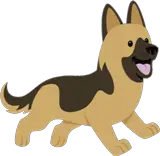Introduction
In the world of dogs, the Pampas Deerhound is a breed that never fails to fascinate. This magnificent breed exudes both grace and vigor, making them equally suitable as companions and guardians. The Pampas Deerhound has a rich and captivating history. Originating in the Pampas region of South America, they were traditionally used as hunting dogs due to their speed, endurance, and keen senses. This guide is a comprehensive resource for anyone considering owning a Pampas Deerhound or just curious about the breed. Here, we delve into their unique characteristics and requirements, and how to care for them to ensure they live a healthy and fulfilled life.
| Characteristic | Detail |
|---|---|
| Tipo de raza | Hound |
| Tamaño | Medium to Large |
| Average Weight | 40-70 lbs |
| Average Height | 22-28 inches |
| Vida útil | 10-14 años |
| Coat Type | Dense and Short |
| Coat Color | Varies (Most Commonly Brown, Grey, or Brindle) |
| Temperamento | Friendly, Patient, Protective |
| Exercise Needs | Alto |
| Aseo | Moderate |
| Good with Children and Other Pets | Sí |
| Health Issues | Hip Dysplasia, Allergies, Eye Conditions |
| Special Training Needs | Socialization, Managing Hunting Instincts |
Detailed Characteristics of Pampas Deerhound
Physical Traits
Pampas Deerhounds are medium to large-sized dogs with a robust build. They boast a dense coat, muscular limbs, and a tail that sweeps proudly upwards.
Temperamento y personalidad
They are known for their friendly and patient temperament. With a natural instinct for protection, Pampas Deerhounds make excellent family dogs, forming strong bonds with their human companions.
Lifespan and Health
Generally, these dogs enjoy a healthy lifespan of around 10-14 years. As with all breeds, they have certain health predispositions, which we’ll discuss in detail in the healthcare section.
Understanding the Pampas Deerhound Breed
Breed Standard
Breed standards for Pampas Deerhounds encompass both physical and behavioral attributes. Physically, they should have a strong build, expressive eyes, and a rich coat. Behaviorally, they are expected to be alert, responsive, and show a gentle disposition.
Common Misconceptions
Some common misconceptions about the breed include their being overly aggressive or difficult to train. In reality, these dogs are quite trainable, and their aggression can usually be managed with proper socialization and training.
Comparison with Similar Breeds
While similar to other hound breeds, Pampas Deerhounds are distinct in their physical traits and temperament. They tend to be more patient and protective, making them an ideal choice for families.
The Ideal Environment for a Pampas Deerhound
Housing Requirements
Pampas Deerhounds need ample space to move around due to their size and energetic nature. A home with a yard is ideal, but they can adapt to apartment living provided they get enough exercise.
Outdoor and Exercise Needs
These dogs need regular exercise to keep them healthy and content. Daily walks, playtime, and mentally stimulating activities should be part of their routine.
Ideal Climate Conditions
They are adaptable to most climates. However, due to their dense coat, they may struggle in overly hot conditions, so appropriate measures should be taken to keep them cool.
Nutrition and Diet for Pampas Deerhound
Dietary Needs of Pampas Deerhounds
Their diet should be high in quality protein and balanced with the right amount of carbohydrates, fats, vitamins, and minerals. Be sure to adjust the portion sizes according to their age, size, and activity level.
Recommended Food Brands and Types
High-quality commercial dog food is usually a good choice. You can also consider a balanced homemade diet but always consult with your vet before making any drastic changes to their diet.
Common Dietary Issues and How to Address Them
Some Pampas Deerhounds may suffer from food allergies or sensitivity. In such cases, a hypoallergenic diet or one tailored to their specific needs can be beneficial.
Training and Socialization of Pampas Deerhound
Training Techniques
Positive reinforcement techniques work well with Pampas Deerhounds. Consistency, patience, and a reward-based approach can help in effective training.
Socialization Tips
Socialization should start from a young age. Exposure to different environments, people, and other animals will help them become well-rounded dogs.
Understanding and Managing Breed-Specific Behaviors
Understanding their hunting instincts and protective nature is key to managing their behavior. These can be channeled in a positive way through games and exercises.
Healthcare and Wellness for Pampas Deerhound
Common Health Problems and Prevention
Pampas Deerhounds can be predisposed to conditions like hip dysplasia, allergies, and eye conditions. Regular vet check-ups and a healthy lifestyle can help prevent these.
Regular Veterinary Check-ups
Routine vet visits are crucial in the early detection and management of any potential health issues. It’s recommended to take your Pampas Deerhound for check-ups at least once a year.
Importance of Mental Health and Enrichment
Mental health is just as important as physical health. Puzzle toys, obedience training, and regular interaction can help keep their minds sharp and engaged.
Grooming Your Pampas Deerhound
Grooming Needs of Pampas Deerhounds
Regular brushing is required to keep their coat healthy and free from mats. They also need their nails trimmed, their ears cleaned, and their teeth brushed regularly.
Recommended Grooming Products and Tools
Use a quality slicker brush for their coat, canine toothpaste for oral health, and gentle dog shampoo for bath time.
Professional Grooming vs. At-Home Care
While professional grooming can be beneficial, most of their grooming needs can be handled at home with the right tools and knowledge.
The Pampas Deerhound as a Family Pet
Interactions with Children and Other Pets
Pampas Deerhounds generally get along well with children and other pets. However, their interactions should always be supervised to ensure everyone’s safety.
Activities for Family Bonding
Family activities such as games, walks, or just cuddling on the couch can help strengthen the bond between the dog and family members.
Addressing Separation Anxiety and Other Behavioral Issues
Like many breeds, they can suffer from separation anxiety. Training, mental stimulation, and sometimes professional help can manage this issue.
Legal and Ethical Ownership of Pampas Deerhounds
Understanding Local Pet Laws and Regulations
Being a responsible owner involves understanding and adhering to local pet laws and regulations. This could include leash laws, licensing, and vaccination requirements.
Ethical Breeding and Adoption Practices
Always choose to adopt or purchase from a reputable breeder or shelter. Ethical breeders prioritize the health and well-being of their dogs above all else.
The Role of Kennel Clubs and Breed Associations
Kennel clubs and breed associations play a vital role in maintaining breed standards, promoting responsible ownership, and providing resources and support to owners.
Common Challenges and Solutions in Owning
Dealing with Breed-Specific Challenges
Some challenges include managing their high energy levels and potential health issues. Regular exercise and vet check-ups can address these.
General Dog Ownership Problems
Challenges such as housebreaking, chewing, and barking can be mitigated with proper training, patience, and consistency.
Solutions and Support
Reach out to local dog clubs, online communities, or a professional trainer for guidance and support when facing challenges.
Conclusión:
This guide covered a comprehensive look into the fascinating breed that is the Pampas Deerhound, its characteristics, care requirements, and tips for successful ownership. Speaking from personal experience and years of expertise, owning a Pampas Deerhound can be a rewarding experience filled with companionship and joy. With the right preparation and commitment, anyone can provide a loving home to a Pampas Deerhound. Remember, responsible ownership is the key to a happy and healthy dog.


